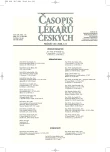Improved Control of Hypertension and Its Effect on Graft Function in Children After Renal Transplantation
Zlepšená kontrola hypertenze a její vliv na funkci štěpu u dětí po transplantaci ledviny
Východisko.
Hypertenze je častou komplikací u dětí po transplantaci ledviny a je spojena se zhoršeným přežíváním štěpů. Přesto je kontrola hypertenze u transplantovaných dětí nízká, neboť pouze 20–50 % léčených hypertenzních dětí má krevní tlak v mezích normy. Cílem této intervenční studie bylo zlepšit účinnost antihypertenzní léčby a zjistit, zda zlepšená kontrola hypertenze povede ke zlepšení funkce štěpu.
Metody a výsledky.
Třicet šest dětí po transplantaci ledviny (průměrný věk 13,9±4,4 let) splňovalo vstupní kritéria. Bylo provedeno ambulantní 24hodinové monitorování krevní tlaku (ABPM) a vyšetřena funkce transplantované ledviny. U dětí se špatně kontrolovanou hypertenzí byly zvýšeny dávky nebo počet antihypertenzních léků, tak aby krevní tlak klesl <95. percentil. ABPM bylo zopakováno po 12 měsících. Po 12 měsících klesl denní i noční krevní tlak, rozdíly však nebyly statisticky signifikantní. Prevalence nekontrolované hypertenze ale významně klesla ze 42 % na 34 % (p<0,05). Stoupl počet antihypertenzních léků z 2,1±0,9 na 2,4±0,8 antihypertenziv na pacienta (p<0,05), zejména ACE-inhibitorů (z 19 % na 27 %, p<0,05). Funkce transplantované ledviny ve sledovaném období klesala v průměru o 3,6 ml/min/1,73m²/rok (p<0,05).
Závěry.
Tato 12mesíční intervenční studie prokázala, že zvýšením počtu antihypertenziv lze zlepšit účinnost antihypertenzní léčby u dětí po transplantaci ledviny. Roční pokles funkce transplantované ledviny byl nižší než v dosavadních observačních studiích.
Klíčová slova:
hypertenze, transplantace ledviny, děti, inhibitory angiotenzin konvertujícího enzymu, funkce štěpu, přežití štěpu.
Authors:
T. Seeman 1,2; E. Šimková 1; J. Kreisinger 1; K. Vondrák 1; J. Dušek 1; P. Dvořák 1
; J. Janda 1
Authors‘ workplace:
Pediatrická klinika 2. LF UK a FNM, Praha
1; Transplantační centrum 2. LF UK a FNM, Praha
2
Published in:
Čas. Lék. čes. 2006; 145: 635-638
Category:
Original Article
Overview
Background.
Hypertension in patients after renal transplantation (RTx) is associated with impaired graft functions and graft survival. Control of hypertension in children after RTx is low – only 20–50 % of children have well controlled hypertension. The aim of this interventional study is to improve blood pressure control and to investigate whether the improved control will improve the graft survival.
Methods and Results.
36 children after RTx (mean age 13.9±4.4 years, time after RTx 2.7±2.4) fulfilled the inclusion criteria. Ambulatory blood pressure monitoring (ABPM) and graft function were examined. In children with uncontrolled hypertension, the dose and number of antihypertensive drugs were increased to reach BP <95th centile. ABPM was repeated after 12 months. After 12 months day-time and night-time BP dropped non-significantly, however prevalence of uncontrolled hypertension improved significantly from 42 % to 34 % (p<0.05). Number of antihypertensive drugs increased from 2.1±0.9 to 2.4±0.8 drugs per patient (p<0.05), namely that of ACE-inhibitors (from 19% to 27%, p<0.05). Graft function decreased by 3.6 ml/min/1.73m²/year (p<0.05).
Conclusions.
This 12months interventional trial demonstrated that control of hypertension in children after RTx can be improved by increasing number of prescribed antihypertensive drugs. The decline of graft function was lower comparing with previous trials.
Key words:
hypertension, renal transplantation, children, angiotensin-converting enzyme inhibitors, graft function, graft survival.
Labels
Addictology Allergology and clinical immunology Angiology Audiology Clinical biochemistry Dermatology & STDs Paediatric gastroenterology Paediatric surgery Paediatric cardiology Paediatric neurology Paediatric ENT Paediatric psychiatry Paediatric rheumatology Diabetology Pharmacy Vascular surgery Pain management Dental HygienistArticle was published in
Journal of Czech Physicians

- Advances in the Treatment of Myasthenia Gravis on the Horizon
- Possibilities of Using Metamizole in the Treatment of Acute Primary Headaches
- Metamizole at a Glance and in Practice – Effective Non-Opioid Analgesic for All Ages
- Metamizole vs. Tramadol in Postoperative Analgesia
- Spasmolytic Effect of Metamizole
-
All articles in this issue
- Metamorphosis of Endocrinology
- Pancreatic Hormones and Hormonal Regulation of Insulin Secretion
- Regulation of Osteoclast Activity: A New Approach in the Therapy of Bone Diseases
- Spontaneous Pneumothorax
- EVI1 and Its Role in Myelodysplastic Syndrome, Myeloid Leukemia and Other Malignant Diseases
- Arterial Hypertension in Children and Adolescents
- Improved Control of Hypertension and Its Effect on Graft Function in Children After Renal Transplantation
- The Use of Nitric Oxide in the Treatment of Acute Respiratory Failure
- Auto- and Alloreactivity of T Lymphocytes in Myelodysplastic Syndrome
- Extent of Tuberculin Skin Testing Spot in Bacteriologically Verified Tuberculosis
- Improving Self-control in Substance Dependent Persons and Pathological Gamblers – A Pilot Study
- The Use of Photoprotection in Children of Prague Agglomeration
- Mitochondrial Neurogastrointestinal Encephalomyopathy (MNGIE)
- Meconium Ileus as a First Symptom of Cystic Fibrosis in a Newborn
- From the history of foster care
- Journal of Czech Physicians
- Journal archive
- Current issue
- About the journal
Most read in this issue
- Spontaneous Pneumothorax
- Meconium Ileus as a First Symptom of Cystic Fibrosis in a Newborn
- Extent of Tuberculin Skin Testing Spot in Bacteriologically Verified Tuberculosis
- Mitochondrial Neurogastrointestinal Encephalomyopathy (MNGIE)
